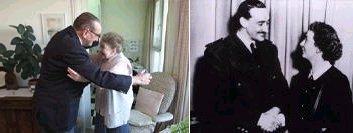THE TIMES MONDAY OCTOBER 23 2000
Survivors of wartime escape route reunited
FROM MARTIN FLETCHER IN BRUSSELS
Jack Newton greets Andree de Jongh, the resistance heroine who saved him,
at her Brussels home yesterday and, right, their reunion shortly after the war
At 1.30am on the night of August 5, 1941, a Wellington bomber was hit by anti-aircraft fire as it returned from destroying a tyre factory in the German town of Aachen.
The pilot managed to land the plane on an airstrip used by the Luftwaffe near Antwerp. The crew scattered under heavy fire, but Jack Newton, the front-gunner, escaped.
The next morning a Belgian worker spotted the British airman in a ditch and took him to a farmhouse. Sergeant Newton did not know it then, but he was to become the first British airman spirited to safety by Andrée de Jongh, the diminutive but determined 24-year-old Belgian woman variously known as "Dédée" or the "Petit Cyclone", who created the "Comet Line" escape route.
Sergeant Newman spent a few months hiding in Brussels and then she smuggled him through occupied France and across the Pyrenees into Spain, where she delivered her "package" to the British consulate in San Sebastián. He was taken to Gibraltar and returned to Britain in a Sunderland flying boat. It had taken him half a year to get home, and 40 families risked their lives helping him.
Dédée made that perilous, eight-hour night trek across the Pyrenees 32 times and delivered 110 airmen to safety before she was arrested in 1943 and sent to Nazi prison camps for the remainder of the war. Her famous Comet Line continued, however, and in all it spirited 800 Allied airmen home to carry on the war.
Sixty years after there are few of those 800 left. Mr Newton, now an 81-year-old retired foreign service officer from East Sussex, was one of four able to attend the annual reunion with their rescuers in Brussels yesterday.
Mr Newton, Albert Day, Bob Frost and Bill Catley gathered in the huge Koekelberg Basilica with about 50 surviving members of the Belgian resistance to commemorate the 150 men and women executed for helping the escape line or who died in concentration camps. The old warriors stood ramrod straight as wreaths were laid at the Comet Line memorial and listened as the priest read the names of former comrades who had died in the previous year.
Dédée won the George Cross for her heroism and was made a countess by Belgium's King Baudouin. She went to Africa to nurse lepers and stayed 28 years. She is still alive, but at 84 is nearly blind and too frail to attend the service. Instead she enjoyed an emotional private reunion with Mr Newton in her small Brussels flat.
"She saved my life," said Mr Newton. "To me the Comet Line was Dédée - an utterly courageous, very forthright character, as tough as they make them. She dashed up the Pyrenees like a mountain goat. If anyone deserves a Victoria Cross, it is Dédée."
"When the war was declared I knew what needed to be done. There was no hesitation," she told The Times. "We could not stop doing what we had to do. We knew what the cost was. Even if it was at the expense of our lives, we had to fight until the last breath."
Next year is the Comet Line's 60th anniversary, and likely to be the last of these reunions. "We've become a family," said Andrée Dumon, the 78-year-old widow who organises the event and is still known by her wartime codename "Nadine".
Nadine was 17 when she joined the Comet Line. She began by finding clothes and food for airmen hidden in Brussels, and ended up escorting them by train to France. She had smuggled more than 20 out of Belgium before she and her family were arrested by the Gestapo one August morning in 1942 at the Brussels house where she still lives.
Nadine and her father were interrogated and sent to different prison camps in Germany and Poland. She never saw him again and barely survived herself. After the war she was decorated by Britain, US and Belgium.
Albert Day, 81, came from California for yesterday's reunion. He was shot down over Luxembourg on August 8, 1941, returning from bombing Frankfurt. He walked to Ostend, was rescued by the Comet Line and escorted by Nadine to the French border.
When he reached Britain he returned to the war as a fighter pilot. "I had to - these people had risked their lives for me," he said.
next page

Click on www.belgiumww2.info to go to HOMEPAGE

